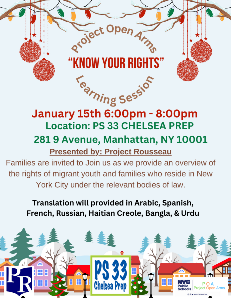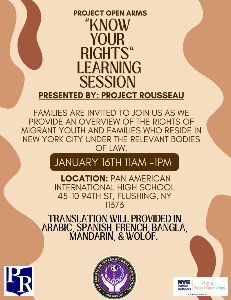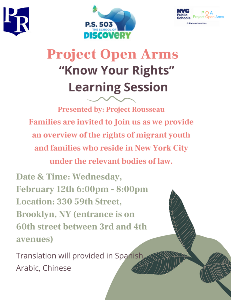Welcome!
Project Open Arms is a comprehensive plan to support families seeking asylum and ensure children are provided a full range of services. This multi-agency plan highlights wraparound services to ensure newcomer families and their children will have access to critical academic, social-emotional, and language-based supports needed to be successful in New York City Public Schools.
The mission of Project Open Arms for NYC Public Schools is to coordinate efforts of all divisions in NYCPS to support our newest New Yorkers successfully.
Upcoming Events
Continue to check back as more sessions are scheduled!
Know Your Rights Family Facing Learning Sessions
Presented by: Project Rousseau
Families are invited to Join us as we provide an overview of the rights of migrant youth and families who reside in New York City under the relevant bodies of law.
Translated Flyers for January 15th: Arabic, Spanish, French, Russian, Haitian Creole, Bangla, Urdu


Know Your Rights
In partnership with Project Rousseau, we have listed resources on your rights as a New York City Newcomer.
Disclaimer:
These resources were created and provided by Project Rousseau, a non-profit organization. This information is provided for informational purposes only and does not constitute legal advice.
- Project Rousseau Immigration Evaluations
This tool is for asylum and Special Immigrant Immigrant Juvenile Status (SIJS - is for children under 21 (in NY) who have been abused, abandoned, or neglected by one or both parent(s) and for whom it is not the child’s best interests to return to their home country) evaluations, Temporary Protected Status (TPS) and work permit applications, or other immigration consultations. I should have mentioned that we have a rapid response screening program and universal representation for unaccompanied minors. Please share the specific sign-up with young people who entered the U.S. on their own, even if they are now reunited with their parents.
Protocols for Non-Local Law Enforcement
For guidance on Non-Local Law Enforcement protocols click here.
New York City Policies
60 Day Policy: 60 Day Notice for families with children- Students residing in Health and Hospital(H&H) or Housing and Preservation and Development Humanitarian Emergency Response and Relief Centers (HERRCs) have received or will receive a notice to secure alternative housing within 60 days of receiving their notice. 60 Day Rule Family Facing Letters:
60 Day Policy Frequently Asked Questions
What is the emergency sheltering policy and when was it announced?
The Emergency Sheltering Policy was announced on October 16, 2023. This began providing the 60 days notice to families with children seeking asylum to find alternative housing along with intensified casework services to help them explore other housing options and take the next steps in their journeys. Each household given notice will have multiple touchpoints with case workers over their 60 days to discuss their options and plan their next steps. This announcement builds on the city’s work giving 30 day and 60 day notices to adults and providing intensified casework services. Please see here for more details.
Who does the policy impact?
At this time, this policy impacts families with children living in the City’s Humanitarian Emergency Response and Relief Centers (HERRCs) and other emergency shelters.
Are all shelters impacted by this new policy?
This policy applies to HERRCs and other emergency shelters. At this time it does not apply to families in DHS emergency shelters.
What happens if families cannot find permanent housing after their 60 day stay in shelter?
The City is committed to working closely with families to ensure they have shelter.
What transportation supports are being provided to families who move housing locations but choose to remain in their school of origin?
Students in grades K-6 living in shelters are eligible for school bus service, or a student MetroCard if their parent declines school bus service.
Students in grades K-6 not living in shelters (for example, who are doubled-up) may be eligible for school bus service or for a student MetroCard.
Preschool students who are temporarily homeless are eligible for school bus service (if an appropriate route exists) or, if they exceed height requirements in MTA regulations to ride for free, will receive a MetroCard.
Parents of students in preschool and grades K-6 who are temporarily homeless are eligible for a MetroCard to accompany their children to/from school.
Curb-to-school busing is provided to students who are recommended for curb-to-school busing on their IEP or 504 Plan without the need to request an exception.
Schools are required to support parents in submitting an “exception request” for transportation; until yellow bus transportation is arranged, families may be eligible to use the DOE’s contract to pay for rideshare services.
Resources
Health Supports
Did you know your child has 30 days to complete their vaccinations in order to attend school? If a student is new to the country/state, is living in temporary housing, AND has an upcoming appointment, there is also an extended grace period (90 days).
More information may be found here and here.
The links below show primary care clinics in all boroughs that provide required vaccinations at no cost to families.
Basic Needs Supports
Care Closets (click the link to see what they look like!) are created in your child’s school to provide basic necessities that your family may need. Such as, school supplies, clothing, non-perishable food, hygiene products and much more. You can work with your parent coordinator to schedule a time to discuss what needs you may have or to visit their care closet!
Mental Health Supports
Mental Health guide for caregivers
Special Education Supports
Special Education Family Resources - Special Education Supports: links to support students with special educational needs
Enrollment/Family Welcome Centers
Enrollment/Family Welcome Center: information on how to enroll children into school.
Language Supports/Translation
Work with the Office of Language Access to access remote language support.
Families may visit schools.nyc.gov/hello for additional language access resources.
NYCPS Language Services - Lays out all language supports for families.
Additional Resources
This document provides additional resources regarding protections for immigrant families.
English, Arabic, Bangla, Chinese (Simplified), Chinese (Traditional), French, Haitian Creole, Korean, Russian, Spanish, UrduOur Partners!
Below is a list of partners we work closely with to provides various resources and supports!
United Way is one of the world’s largest privately funded charities that work with private, public, and nonprofit partners to boost education, economic mobility, and health resources.
Hispanic Federation is a Latino nonprofit membership organization that empowers and advances the Hispanic community, supports Hispanic families, and strengthens Latino institutions through work in the areas of education, health, immigration, civic engagement, economic empowerment, & the environment.
Gambian Youth is a nonprofit organization that helps build a society of ambitious and confident youth, to serve as future leaders.
Advocates for Children is a nonprofit that tackles school-based discrimination and/or academic failure due to poverty, disability, race, ethnicity, immigrant or English Language Learner status, sexual orientation, gender identity, homelessness, or involvement in the foster care or juvenile justice systems.
NY Immigration Coalition is a nonprofit multi-racial and multi-sector NYIC membership base that includes grassroots and nonprofit community organizations, religious and academic institutions, labor unions, as well as legal and socio economic justice organizations. The NYIC not only establishes a forum for immigrant groups to voice their concerns, but also provides a platform for collective action to drive positive social change.
El Puente Leaders for Peace and Justice is a youth- centered human rights organization, focusing on education, the arts, environmental justice and wellness to inspire leadership for social justice.
Committee for Hispanic Children & Family provides programs that reach underserved, low- and moderate- income children and families throughout New York City and the home-based child care providers who serve them. They are one of the few Latino organizations in New York that combine direct service with policy work to amplify minority voices at the local, state, and national levels.
Coalition for Community Schools Excellence goals are targeted toward advancing equity in community schools, sustaining the community school strategy, & extended learning time with the help of community based organizations.
Make the Road NY focuses on legal services, education, training, and college access through their various programs that they offer. Such programs include adult literacy, civic engagement, community organization, school programs, and leadership training.
Children’s Aid helps children in poverty to succeed and thrive by providing comprehensive support to children, youth, and their families in targeted high-needs New York City neighborhoods.
Mayor’s Office of Immigration Affairs/ActionNYC recognizes that immigrant New Yorkers and their children make up a significant proportion of the City's population.
Our charter-mandated responsibilities include advising and assisting the mayor, council, and other agencies on programs and policies related to and designed for immigrant New Yorkers; tracking state and federal policy and law that will impact immigrant New Yorkers; increasing access to city programs, benefits, and services by conducting outreach; and helping advise on the legal service needs of immigrants. MOIA is also tasked to work with the relevant city agencies to address the needs of immigrant crime victims and witnesses, including by working with agencies on the issuance of U visa certifications and T visa declarations.
Counseling in Schools currently provides New York City schools support for 7,000 students in 94 programs and community shelters. Professional development services include peer support to affirm the strengths of teachers and administrators in their commitment to education.
City Year a national service program to unite young adults from diverse backgrounds for a demanding year of full-time community service.
Manhattan Youth provides the highest quality childcare and After-School programs plus academic, recreational and cultural activities for children, families and individuals who live or work in Manhattan, regardless of income. Their programs stimulate, challenge and strengthen children, teens, adults, seniors and families. Their primary activities are After-School programs, Summer Camps, Aquatics, and a variety of classes and programs at our Community Center.
FAQ’S
Enrollment
Does NYC Public School ask families for their countries of origin or their immigration status?
We do NOT ask families about country of origin or asylum-seeking status
Can families only utilize the enrollment center in their borough where they live?
Families can visit any Family Welcome Center throughout the city. Enrollment Staff is here to assist and enroll students regardless of their district.
When can students enroll for school?
Family Welcome Centers enroll students year-round, just as schools do, typically as soon as they arrive at our office. Our goal is to make the enrollment process smooth and accessible.
Do families need an enrollment letter to enroll in their zoned elementary or middle school?
Families do not need an enrollment assignment letter to register at their zoned elementary or middle school. In fact, they can go directly to their zoned school with proper registration documents.
